Contributor(s): Shared on: Categories: Tags: | Source (Hebrew) | Adaptation (German) | Translation of German (English) |
|---|
הַלְלוּ אֶת־יְהֹוָה כׇּל־גּוֹיִם
שַׁבְּחוּהוּ כׇּל־הָאֻמִּים׃
כִּי־גָבַר עָלֵינוּ חַסְדּוֹ
וֶאֱמֶת־יְהֹוָה לְעוֹלָם הַלְלוּ־יָהּ׃ |
Ihr Völker alle, kommt unsern Gott zu loben
Und preiset ihn und huldigt seiner Macht!
Denn seine Güte waltet über uns
Und nicht in Ewigkeit wankt seine Treue. |
All you folk, come to praise our God
And praise him and pay homage to his power!
For his goodness reigns over us
and his faithfulness will forever not waver. |
This adapted translation of Psalms 117 by Lisa Tarlau can be found in Rabbi Max Grunwald’s anthology of Jewish women’s prayer, Beruria: Gebet- und Andachtsbuch für jüdische Frauen und Mädchen (second revised edition 1909), page 167. The transcription of the German provided machine-readable text for machine translations by DeepL, which we then edited for accuracy and clarity. We welcome any/all corrections, improvements, and additional transcriptions and translations of this work’s contents. –Aharon Varady Source(s)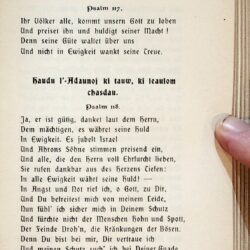 Hallel (Lisa Tarlau, Beruria, 1909) p. 167
Aharon Varady (M.A.J.Ed./JTSA Davidson) is a volunteer transcriber for the Open Siddur Project. If you find any mistakes in his transcriptions, please let him know. Shgiyot mi yavin; Ministarot naqeni שְׁגִיאוֹת מִי־יָבִין; מִנִּסְתָּרוֹת נַקֵּנִי "Who can know all one's flaws? From hidden errors, correct me" (Psalms 19:13). If you'd like to directly support his work, please consider donating via his Patreon account. (Varady also translates prayers and contributes his own original work besides serving as the primary shammes of the Open Siddur Project and its website, opensiddur.org.)  Lise Tarlau (also known as L'Ysaye/Isaye/Ysaye/Ysale, Lisa, Lize, Elizabeth, Luise, and Louise Tarleau; 1879-1952), was a writer born to a prominent Viennese Bohemian Jewish family, the daughter of Rabbi Dr. Joseph Samuel Bloch and Laura Lachmann. In an essay published in 1906, "The Religious Problem," she expressed enthusiasm for Zionism and a deep sympathy for East European, Yiddish speaking Jewry, praising them for having retained their own distinctive cultural identity and their own language. This posture was accompanied by harsh criticism of Western European Jewish cultural assimilation, writing that they have “lived as parasites on the creative possibilities of the dreams of beauty of other peoples” (as quoted in Peter Singer's Pushing Time Away, 2003). Before emigrating to the United States in 1908, nearly two dozen prayers she wrote were published in Beruria (1907), an anthology of teḥinot in German compiled by her sister's husband Rabbi Dr. Max Grunwald. A decade later in the US, Houghton Mifflin Company and Riverside Press published The Inn of Disenchantment (1917), a collection of her prose and several short stories. Tarlau's fiction also appeared in major magazines of the day, including The Nation (105:2725, September 20, 1917), The Atlantic Monthly (in 1919), and Harper's Magazine. In 1924, her short story " Loutré" was awarded second place in Harper's first ever short story contest. During World War II, she wrote a number of scripts for radio and film and worked as a translator for the US military. Several of her works were included in The Fireside Book of Romance (ed. C. Edward Wagenknecht, 1948). She died on October 9, 1952 in Kew Gardens, Queens, Long Island, New York. The Mesorah (Heb: מָסוֹרָה) a/k/a, the Masoretic text is the authoritative Hebrew and Aramaic text of the TaNaKh for Karaite and Rabbinic Judaism. It was primarily copied, edited and distributed by a group of Jews known as the Masoretes between the 7th and 10th centuries CE. The Masoretic Text defines the Jewish canon and its precise letter-text, with its vocalization and accentuation known as the Masorah. Read a comment / Leave a comment (moderated) Works of related interest: |


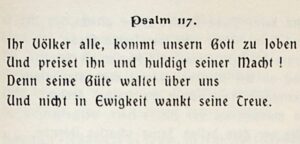

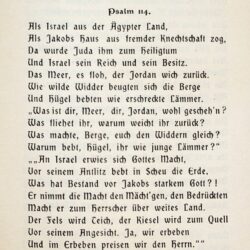
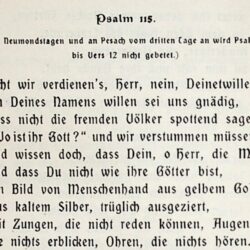
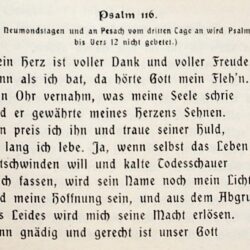
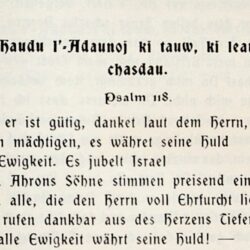
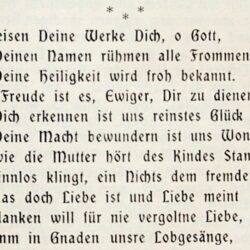



Leave a Reply